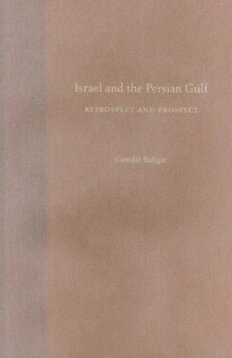
Israel and the Persian Gulf: Retrospect and Prospect PDF
201 Pages·2005·0.619 MB·English
Most books are stored in the elastic cloud where traffic is expensive. For this reason, we have a limit on daily download.
Preview Israel and the Persian Gulf: Retrospect and Prospect
Description:
Despite the volume of literature on the Persian Gulf and the Arab-Israeli conflict, few analysts have sought to establish the connection between the Gulf and the Levant. Bahgat argues that peace between the Arabs and the Israelis and stability in the Persian Gulf are intertwined, and as developments in one region are echoed in the other a détente between the Persian Gulf states and Israel is essential to reach a lasting, comprehensive peace in the greater Middle East. Bahgat examines major economic, political, and strategic interactions among Tehran, Baghdad, and Riyadh on one side and Tel Aviv on the other to provide tentative assessments of the incipient changes in regional relations in the aftermath of Saddam and Arafat. The assessments include the prospects for relations between post-Saddam Iraq and Tel Aviv and the response of Tehran, Riyadh, and the other Arab states to the changing dynamics of the regional order. The likelihood of an emergent rapprochement between the Persian Gulf states and Israel and the prospects for progress in the Arab-Israeli peace process are also evaluated. Interweaving systems theory, realism, geopolitics, decision-making theory, ideology, and ethnic relations, Bahgat’s account of developments between Israel and each of the Gulf states and the nuances of Israel’s Persian Gulf policy provides a long-needed bridge connecting the two Middle Eastern subsystems.
See more
The list of books you might like
Most books are stored in the elastic cloud where traffic is expensive. For this reason, we have a limit on daily download.
